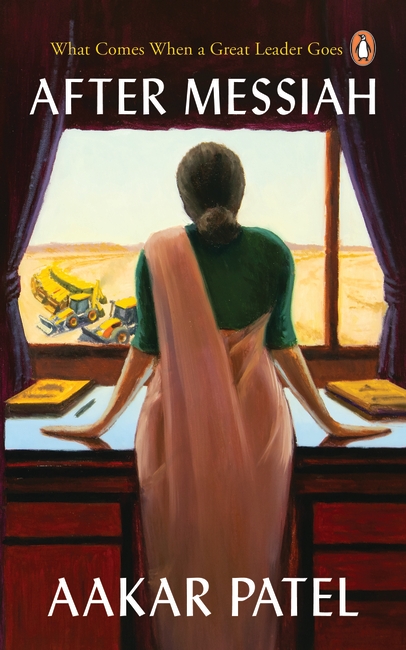After Messiah
£9.95
Aakar Patel
Paperback 9780143462293
‘Everyone bowed to the Big Man. He was glorified, deified even, with temples raised to him, as the embodiment of the nation.’
Description
Now the Big Man is gone, with nobody named as his successor. Into this void is pushed Mira, who is reluctant at first but increasingly interested in the position she finds herself in. Will she use her authority to further her agenda, or will she hold on to her principles? Watched by her political rivals, Jayeshbhai and Swamiji, and guided by well-wishers Ayesha, Prabhu and Du Bois, she marches on and discovers something about power-and about herself.
Reviews
‘A meditation on power and its nature and future in India today
In his first novel, the columnist-author uses fiction to engage with facts almost too brutal to contemplate.
Reading After Messiah, columnist and author Aakar Patel’s first work of fiction, is a fairly surreal affair. The book is carefully undated, few characters possess names, even locations are unspecified. Yet, the backdrop is all too familiar — in fact, I only had to look up from the book and glance at the newspaper to find developments uncannily similar to a key narrative in the novel.
All of which makes After Messiah an unsettling experience, something like equating a movie watched at the cinema with a subversive act. Patel has emerged as one of the most consistent and acute chroniclers of India’s recent history. Fiction, I suspect, allows him to explore areas barred to most by a basic sense of self-preservation. But is it dystopia? Is it satirical? Wishful thinking? Futurist fantasy?’ – Sumana Mukherjee – The Hindu
‘In light of [these] contemporary political processes and destructive rhetorics, a timely intervention has been made in the public sphere – a fiction (yet non-fiction) book by Human Rights activist Aakar Patel.
Aakar Patel gives readers a new chance to understand the multiple narratives and complexities that go into making the State, the chance to understand the tenets of legitimacy, authority, and power in layperson terms to make sense of the contemporary scenario surrounding us. He presents a new ought-to-be, a new idea of utopia and hopes to achieve it. Who knows, maybe thinking out loud on this text, we can draw parallels with Indian Politics too!’ – Nikhil Sanjay-Rekha Adsule, Outlook
‘After tackling the past and the present in his previous books, Patel has moved to the future. After Messiah is a satirical, fictional take on our future. The most powerful parts of this novel though, are the ones that you and I wish were fiction but know otherwise.
In Patel’s latest, a dramatic physical fight between politicians may remind you of televised battles in parliament and how democracy is increasingly a farce. There’s resort politics and philosophical musings on whether the state can be anything other than violent and how humane leaders should tackle dissent. No real novel of our times can be complete without preventive detention, but this law plays a supporting role to the Land Acquisition Act. Plus there’s music and humour because this is Patel after all.
Is the author trying to tell us that any political option is better? Or is he saying the system won’t let anyone do better? You’ll have to read the book to find out.’ – Priya Ramani, The Wire
‘Over the last decade, if there has been one thing that has occupied centre stage in Indian politics, it’s this question: If not him, then who? This, however, is not a question of capability but of a personality cult – it’s not a person but a larger-than-life image that one is contemplating a replacement for.
Reality may limit the possibilities, but fiction offers fertile ground for the imagination. Such as this one: What will happen if the Great Leader dies? In these circumstance, the question of “who” no longer challenges or opposes authority, it becomes an attempt to investigate a worthy successor: someone equally or similarly charismatic. That’s the urgency that drives Aakar Patel’s novel After Messiah.
Most important, Patel’s narration forces us to realise and acknowledge our own hypocrisy. He seems to be asking: ‘What will you do if you become powerful?’ The story, in fact, underlines the fact that power does not always bring out the best in anyone, nor is it wielded in the interest of the people.’ – Saurabh Sharma – scroll.in
The author
Aakar Patel is a syndicated columnist who has edited English and Gujarati newspapers. His translation of Saadat Hasan Manto’s Urdu non-fiction, Why I Write, was published in 2014. His study of majoritarianism in India, Our Hindu Rashtra: What It Is. How We Got Here, was published in 2020. And his analysis of India’s performance under Prime Minister Narendra Modi, Price of the Modi Years, was published in 2021. He is chair of Amnesty International India.
Additional Information
| By | Aakar Patel |
|---|---|
| Published by | Penguin India |
| ISBN | 9780143462293 |
| Format | Paper |




